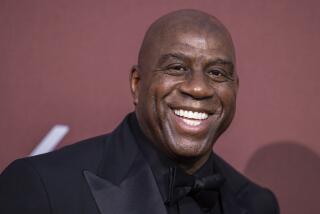MAGIC RETIRES AGAIN : Representatives of AIDS Services Regret Decision
- Share via
WASHINGTON — Representatives of the AIDS community reacted with anger and sadness Monday at Magic Johnson’s decision to retire, calling it a tragedy that Johnson felt compelled to give in to the controversy surrounding his impending return.
“It is tragic that someone as beloved and respected as Magic Johnson has had to leave his life’s work because of peoples’ unwarranted fears,” said Dr. David Rogers, co-chairman of the National Commission on AIDS, where Johnson served until he resigned recently to protest what he said was the Bush Administration’s neglect of the epidemic.
What Johnson has faced in recent months, Rogers said, is but a small part of what other ill or infected individuals have had to deal with every day, many of them without the resources and support that Johnson enjoys.
“It’s the tip of the iceberg of what many thousands of other people with HIV infection have had to face in their own lives,” Rogers said. “We’ve seen it over and over again in our work on the commission. It just saddens me that we haven’t been able to further reduce or eliminate this unreasonable fear of AIDS. I was profoundly saddened by it.”
Jeff Levi, director of governmental affairs for the Washington-based lobbying group, AIDS Action Council, agreed.
“I think it’s a commentary on how deep-seated ignorance and discrimination have been allowed to take root, and it’s tragic that someone around whom there has been so much publicity could not overcome this kind of discrimination,” he said.
Dr. Mervyn F. Silverman, president of the American Foundation for AIDS Research, called it both sad for Johnson and sad for continued public education efforts against the stigma associated with AIDS.
“It’s very sad for Magic because his whole life has been involved with competitive sports and he shouldn’t have to step off the court,” he said. “And it’s really sad for what we’ve been trying to convey to the public. Now I’m afraid the old fears about casual contact--about sending children to school and to the playground with HIV-infected kids--and other irrational fears will come back--if ever they’ve left.”
Silverman stressed that of all the AIDS cases in the United States--which now total nearly 250,000 during the more than 11 years of the epidemic--not a single infection has been attributed to sports contact.
“We don’t know of any in almost a quarter of a million people diagnosed with AIDS,” Silverman said. “That doesn’t mean that it couldn’t happen. But there’s probably a greater risk to athletes in their everyday lives--driving their cars and crossing the street--than playing basketball with Magic Johnson.”
Silverman also warned that a false sense of security could prevail with Johnson’s departure from the sport.
“There is no reason to believe that there are fewer professional athletes that are infected with HIV than other groups, meaning that Magic is probably not the only one,” Johnson said. “He’s just the only one we know about. If you’re going to worry--which you shouldn’t--then worry about more than Magic Johnson. What this does is diminish the impact he had in going public in the first place--on those individuals in similar circumstances--and make it all the more difficult for others to do so. It just drives those with the disease further underground.”
Dr. Anthony S. Fauci, director of AIDS research activities for the federal government’s National Institutes of Health, said he feared Johnson’s decision would have a discouraging effect on other HIV-infected persons who had not yet become debilitated by the disease.
“He was such a positive role model for others with HIV infection--people could look at him and say, ‘There’s someone infected, just like me, and not only is he continuing to play, but playing magnificently,’ ” Fauci said.
“People could look at him and feel they could do whatever it is that they do as long as they feel well enough. That was a tremendous source of inspiration for them not to crawl into their rooms and wait to get sick. That was the greatest impact that Magic Johnson’s return would have had.”
Rogers, of the AIDS commission, said he was especially distressed to have read recent stories that described other basketball players who were still afraid to play with Johnson, and other stories about players calling upon Johnson to be forthright about how he contracted the virus. All along, Johnson has insisted that he was infected through heterosexual relations.
“I haven’t talked with him lately, but I’ve been reading all these mean-spirited pieces--about the concerns of his fellow players that hurt him, and people wondering how he might or might not have gotten the virus,” Rogers said. “I have felt for him, just reading them, and thinking how much that must hurt. It’s a terrible commentary, when people are so afraid--or when how someone might or might not have gotten it assumes such importance.
“That isn’t very important,” Rogers said. “What’s important is that people are sick and dying--and still being discriminated against.”
Fauci also said he was concerned that--if part of Johnson’s decision was based on speculation that he was gay--other infected individuals might be reluctant to make their condition public because they were afraid similar rumors might start about them.
“Who cares if someone is gay? Magic Johnson says he isn’t, and I believe him,” Fauci said. “But it shouldn’t matter. There is such a stigma in society about homosexuality and that shouldn’t be. If that played a role in his decision, it’s unfortunate. It only underscores the prejudice in society against gay people.”
More to Read
Sign up for Essential California
The most important California stories and recommendations in your inbox every morning.
You may occasionally receive promotional content from the Los Angeles Times.













